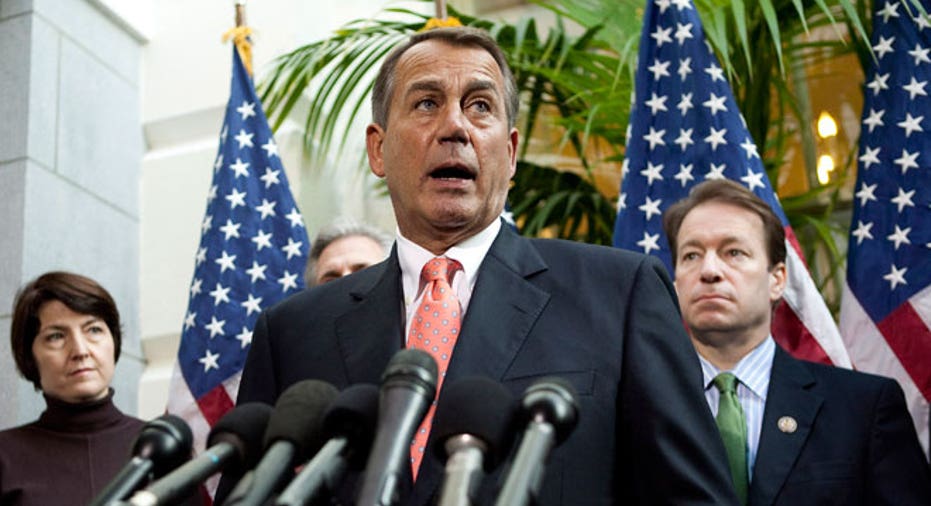House, Senate Clash Over Payroll Tax Cut

With a tax cut for 160 million U.S. workers set to expire in less than two weeks, Republicans and Democrats in Congress Monday were mired in a last-ditch battle over extending it.
In a surprise turnabout, Republicans in the House of Representatives are now pushing for a one-year extension of the payroll tax cut and have rejected a short-term compromise struck by Republicans and Democrats in the Senate at the weekend.
House Republicans had initially expressed concerns over the economic benefits of renewing the tax break, which expires on Dec. 31, and soon-to-expire jobless benefits.
The House is expected late on Monday to defeat the bill passed overwhelmingly by the Senate on Saturday and then seek negotiations on a new compromise measure.
But the path to compromise was far from clear as Democrats took a hardline stance and accused House Republicans of reneging on the deal between their brethren and Democrats in the Senate.
Democratic Senate leader Harry Reid said he was unwilling to reopen negotiations. Almost all senators have already left Washington for the holidays and the Democratic-controlled chamber has no legislative business scheduled until Jan. 23.
The stand-off between Republicans and Democrats raised the specter of a $1,000 tax hike on the average American worker and millions of unemployed losing their benefits. One influential economist told Reuters that failure to extend the tax break heightened the possibility of a U.S. recession in 2012.
The rebellion by House Republicans against the Senate deal, which had the blessing of Senate Republican leader Mitch McConnell, raised fresh questions about Speaker John Boehner's control over his restive caucus, which has repeatedly balked this year at compromising with Democrats.
At issue is a phone call between Boehner and rank-and-file members on Saturday. A veteran House Republican member, who asked not to be identified, told Reuters Boehner initially backed the Senate deal but back-pedalled after being caught off guard by the angry response of members.
Boehner has since denied flip-flopping on the issue.
Boehner has struggled to control his caucus, which includes scores of Tea Party-affiliated members elected to Congress in the November 2010 elections, propelled by voters furious about a bad economy and government spending.
A House Republican aide, who asked not to be identified, said McConnell kept Boehner informed of last week's Senate negotiations. But the aide declined to elaborate when asked by Reuters whether the Speaker had pushed back against the two-month extension.
DEEPENING DYSFUNCTION
At least two Republican senators blasted House Republicans for refusing to approve the Senate deal.
"The House Republicans' plan to scuttle the deal to help middle-class families is irresponsible and wrong," said Republican Senator Scott Brown.
Senator Richard Lugar said House members must do what is "best for the country" and pass the Senate measure.
Without a deal, workers' payroll taxes will rise on Jan. 1 to 6.2 percent, from the current 4.2 percent. Some unemployment benefits, now at 99 weeks amid the weak economy, also would begin phasing out early next year, ending benefits for millions of people who have been jobless for an extended period.
The end-of-year fight caps a tumultuous year and will deepen the sense of dysfunction in Washington. This latest battle caught even cynical Capitol Hill watchers by surprise.
Credit rating agencies are already skeptical Washington's politicians have the political will to steer the country through global economic instability. Americans heading to the polls in 2012 have also lost confidence in Congress, opinion polls show.
For much of 2011, Republicans and Democrats sparred over spending, debt levels and taxes, bringing the government to the brink of shutdown and costing the United States its prized AAA credit rating from Standard & Poor's rating agency.
Now, some economists are predicting even worse times ahead if Congress fails to renew the payroll tax cut.
Mark Zandi, chief economist at Moody's Analytics, speaking to Reuters Insider, bluntly warned: "I do think recession odds will rise quite significantly early next year if it is not extended."
Zandi said most of the impact would be felt in the first half of 2012, at a time when the U.S. economy is most exposed to risks from a debt-riddled Europe and a continuing U.S. housing foreclosure crisis.
If the House formally requests negotiations with the Senate, as expected, Reid will have to decide whether to reverse course and bring senators back to do more legislating.
Before voting to request new talks with the Senate, the House is expected to defeat the Senate-passed bill, according to a House Republican aide.
If Reid then refuses to engage in new negotiations, it's unclear if lawmakers would find yet another way to avoid having the p ayroll tax revert to its pre-2011 6.2 percent, at least until early next year when Congress starts its 2012 session.



















